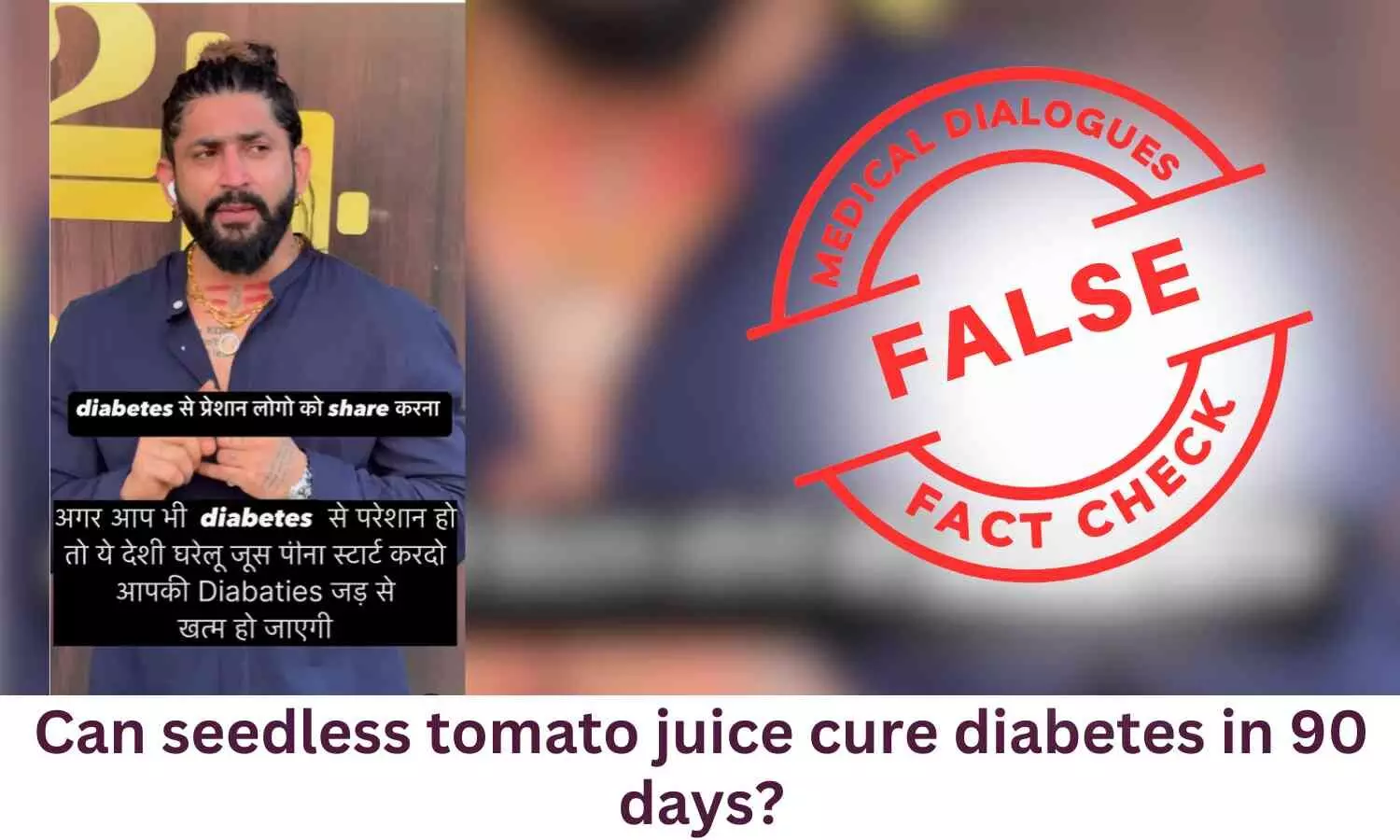Fact Check: Can seedless tomato juice cure diabetes in 90 days?

An Instagram reel claims that seedless tomato juice cures diabetes in 90 days. The claim by the user is False.
Claim
In an Instagram reel claims that seedless tomato juice cures diabetes in 90 days. In the reel, the user, dk_singh_797 says, "Many people are troubled because of sugar. I am telling you such a method that your sugar will also end completely and you won’t even have to spend ₹1, plus there will be no harm. I am telling you a very good, very easy, and very desi (traditional) method and it gets ready in 1 minute. You won’t waste much time on it. You need to take half a tomato. Chop it but keep one thing in mind – you have to remove the seeds from inside. After removing the seeds, chop it well and grind it. After grinding, mix half a glass of water in it. So basically, tomato juice will be ready. You have to take this daily for 90 days. It will completely finish your sugar from the root and you won’t have to spend ₹1, there will be no harm, and this is a very good thing for you."
The claim can be accessed here.
Fact Check
The claim by the user is False. Tomatoes are a valuable addition to a diabetes-friendly diet, aiding diabetes management though the condition itself cannot be cured.
What is Diabetes?
Diabetes is a chronic condition that occurs either when the pancreas does not produce enough insulin or when the body is unable to use the insulin effectively. Insulin is a hormone essential for controlling blood glucose levels. Poorly controlled diabetes leads to hyperglycemia, or high blood sugar levels, which, over time, can cause serious harm to different body systems, especially the nerves and blood vessels.
What are the Types of Diabetes?
Diabetes exists in several forms, and the World Health Organization (WHO) classifies it into four main types:
Type 1 diabetes, also known as insulin-dependent or juvenile diabetes, occurs due to the pancreas producing little or no insulin. Individuals with this type require daily insulin administration to manage blood sugar levels. As of 2017, around 9 million people worldwide were affected, predominantly in high-income countries. The exact cause remains unclear, and no definitive preventive measures have been identified.
Type 2 diabetes impairs the body's ability to utilize insulin effectively, resulting in elevated blood glucose levels. Over time, this can lead to complications such as nerve damage and cardiovascular issues. Type 2 diabetes is largely preventable, with key risk factors including obesity, physical inactivity, and genetic predisposition. Early diagnosis through routine screenings is essential, as symptoms often develop gradually and may remain unnoticed until complications arise. It accounts for over 95% of diabetes cases and, although previously referred to as non-insulin dependent or adult-onset diabetes, it is now increasingly seen in younger populations, including children.
Gestational diabetes is a form of hyperglycemia first identified during pregnancy. While blood sugar levels are higher than normal, they are not high enough to classify as diabetes. This condition increases the risk of complications during pregnancy and childbirth and elevates the mother and child’s future risk of developing type 2 diabetes. Diagnosis typically involves routine prenatal screening. (
Additionally, Impaired Glucose Tolerance (IGT) and Impaired Fasting Glycemia (IFG) are pre-diabetic states characterized by blood sugar levels that are elevated but not yet within the diabetic range. While these conditions heighten the risk of progressing to type 2 diabetes, progression is not inevitable and may be mitigated with lifestyle interventions.
Can Diabetes Be Cured?
At present, there is no definitive cure for diabetes; however, many individuals can achieve diabetes reversal. This means managing blood glucose levels so effectively that the need for medication is eliminated, and normal levels are sustained without pharmaceutical intervention. Achieving and maintaining this state typically requires a long-term commitment to a balanced diet, regular physical activity, and overall healthy lifestyle choices.
Dr Vrinda Agrawal, Consultant Endocrinology at CARE Hospitals, Banjara Hills, Hyderabad also said, "Diabetes is a chronic metabolic condition that can be effectively managed, but not necessarily cured in most cases. While lifestyle modifications, medications, and in some cases, bariatric surgery can help achieve remission in certain individuals, long-term monitoring is essential. The goal of diabetes management is to maintain healthy blood sugar levels and prevent complications rather than seeking an outright cure."
What are the health benefits of tomato juice?
Tomato juice is a potent source of antioxidants, particularly lycopene, which contributes to heart health and may help lower the risk of certain cancers. It is also rich in essential vitamins like A, C, and K, supporting immunity, eye health, and strong bones. Additionally, its dietary fiber promotes healthy digestion, while its potassium content plays a role in maintaining optimal blood pressure levels.
Can seedless tomato juice cure diabetes in 90 days?
No, seedless tomato juice cannot cure diabetes in 90 days. Tomatoes can be a valuable addition to a diabetes-friendly diet, supporting both diabetes management and reducing the risk of the condition. However, it is essential to understand that diabetes cannot be cured; it can only be effectively managed. Further, there is no scientific evidence or medical consensus to support the claim made by the user.
Tomatoes have been shown to potentially help reduce risk factors associated with type 2 diabetes Consuming tomatoes has been shown in a clinical trial published in the International Journal of Food Sciences and Nutrition to potentially lower type 2 diabetes risk factors.
Tomatoes also have been further recognized for their potential in managing diabetes-related complications, as highlighted in an article published in the International Journal of Food Properties emphasizes the role of tomatoes in managing diabetes-related complications by lowering oxidative stress, inflammation, atherosclerosis, and tissue damage linked to diabetes, including damage to the retina, kidneys, and musculoskeletal system.
Similarly, Parisha Alam et. al. concluded that fresh tomato consumption may help ward off obesity, diabetes, and cardiovascular dysfunction by modulating the biochemical pathways involved.
Tomatoes are rich in nutrients that support overall health and may reduce risk factors associated with type 2 diabetes and also beneficial for managing the condition. However, it is important to note that diabetes cannot be cured; it can only be effectively managed.
Responding to the claim Dr Srinath Aswathiah, Consultant - Diabetologist & Endocrinologist, Gleneagles BGS Hospital Kengeri Bengaluru explained, "Diabetes is a chronic metabolic condition that can be prevented or managed effectively, but it cannot be "cured" in the conventional sense. For individuals at risk of developing diabetes, healthy lifestyle measures—such as a balanced diet, regular exercise, weight management, and maintaining healthy blood sugar levels—can significantly reduce the risk and, in some cases, prevent the progression to full-blown diabetes. For those who have already been diagnosed with diabetes, the condition can often be well-controlled with minimal medication, and in the early stages (prediabetes or newly diagnosed Type 2 diabetes), blood sugar levels can sometimes be managed through lifestyle changes alone. However, this depends on individual factors like genetics, insulin resistance, and overall health. There is no scientific evidence to support the claim that seedless tomato juice can "cure" diabetes in 90 days, as some social media reels suggest. However, tomatoes have some beneficial properties: Low Glycemic Index (GI) and Glycemic Load (GL): Tomatoes have a low GI and GL, meaning they do not cause a rapid spike in blood sugar levels. Tomato Juice and Blood Sugar: Drinking unsalted, fresh tomato juice is unlikely to significantly raise blood sugar levels. However, store-bought or homemade tomato juice with added salt can increase sodium levels, which in turn can affect blood pressure and overall metabolic health, indirectly influencing blood sugar regulation. While tomatoes can be a healthy addition to a balanced diabetic-friendly diet, they are not a cure for diabetes. The best approach to managing diabetes involves a well-rounded diet, regular physical activity, weight control, and adherence to medical guidance rather than relying on unproven social media trends."
Dr Vrinda Agrawal, Consultant Endocrinology at CARE Hospitals, Banjara Hills, Hyderabad further said, "There is no scientific evidence to support the claim that seedless tomato juice can cure diabetes in 90 days. While tomatoes are rich in antioxidants and may contribute to overall health, diabetes management requires a comprehensive approach, including a balanced diet, physical activity, medication if necessary, and regular medical supervision. Misinformation like this can be misleading, and I strongly advise individuals to consult their healthcare provider before considering any alternative remedies."
Dr Debmalya Sanyal, Consultant, Rabindranath Tagore International Institute of Cardiac Sciences, Kolkata also said, "No food supplement can cure diabetes, please follow a healthy diet and exercise regularly to prevent diabetes and also to control along with medicines."
Health Dialogues Final Take
The claim that drinking tomato juice can cure diabetes within 90 days is false. While tomatoes provide health benefits and can aid in diabetes management, there is no scientific evidence or medical consensus to support the notion that they can cure diabetes.
Hence, the claim by the user is FALSE.



